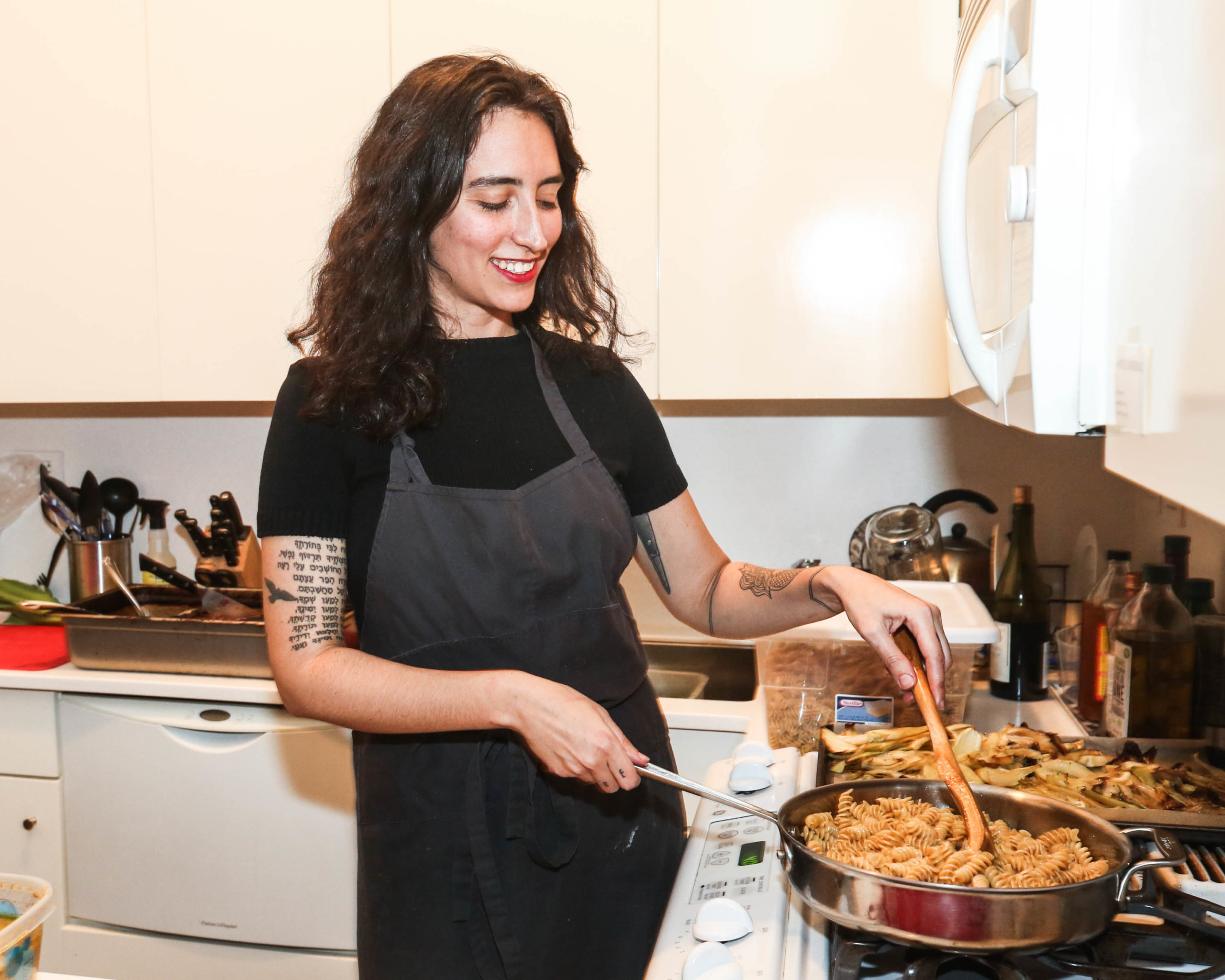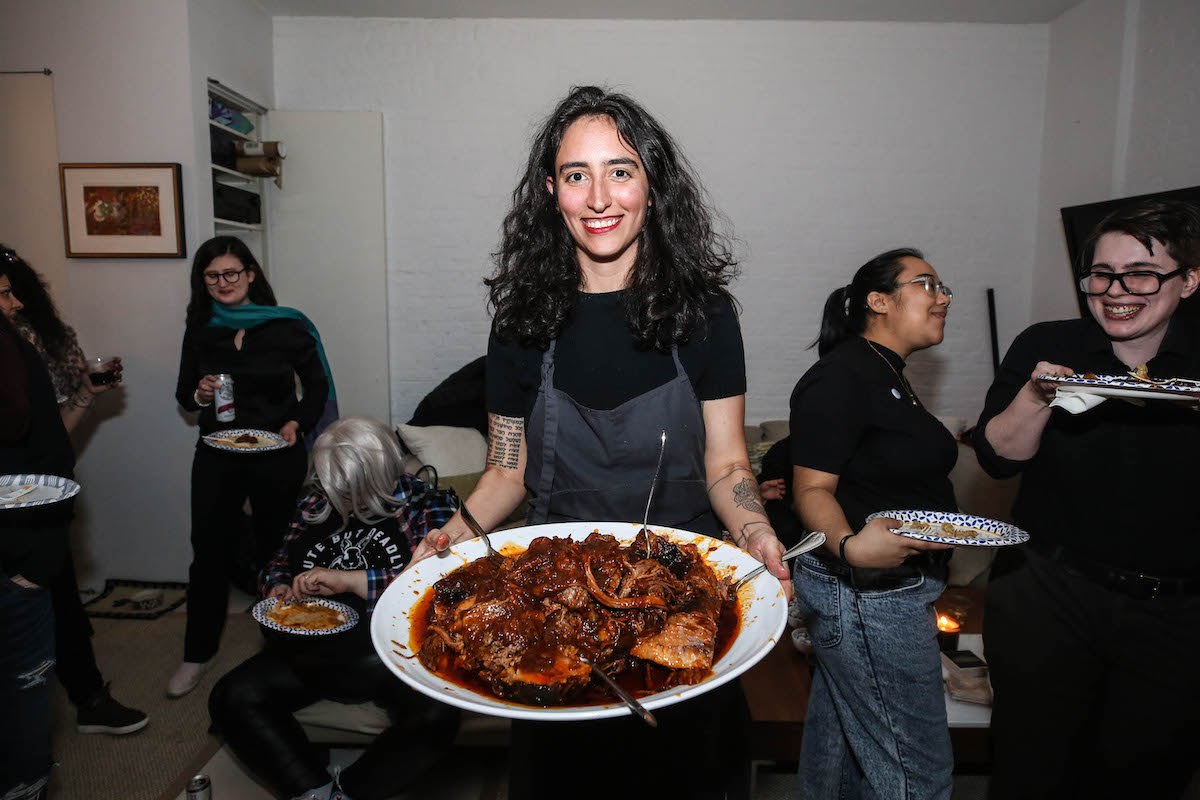Alex Koones is no stranger to the queer scene in New York City. She founded the popular pop-up dinner party series called Babetown in 2016, where she brings queer women, non-binary people, and trans folks together to celebrate who they are, eat fantastic food, and build ironclad friendships.
When COVID-19 began to wreak havoc on New York City, Koones jumped into action. Anxiety and depression can be a beast, and while most of the world seemed to be cooking up a storm, others felt paralized.
Koones found a solution, and it’s called “Babes in Quarantine.”
She now cooks and delivers homemade healthy meals to people throughout New York City for an affordable price, all on her own. She then uses those funds to provide low-income queer folks with the free meals they need to survive. Not only does she offer prepared home-cooked meals, but she goes so far as to offer vegan, gluten-free, and plant-based options all for the same low price of $60 for seven meals.
I remember the first time I met Koones. She offered me two free tickets to the 2017 Babetown Pride Party that I couldn’t afford. Her kindness was clear. It wasn’t about who could pay and who couldn’t. It was simply about how she could serve the community and support those in need. Koones radiates a kind of energy that I was so familiar with: the Jewish will to change the world from your own corner of it.
Now is no different. I chatted with Koones about Babetown, her favorite Jewish foods, and what inspired “Babes in Quarantine.”
This interview has been edited and condensed for clarity.
Before the pandemic, you ran a pop-up dinner series called Babetown. Can you tell me about that?
Of course. Babetown is my pop-up supper club for queer women, trans, and non-binary people. I describe it to people as a house party with food. I try to offer people an alternative social experience to a bar or a club — it’s a party in a private home and it’s all inclusive (all you can drink and eat).
I only take 40-60 people per party so people are a little more likely to just start talking to each other and making new friends than if they’re approaching a stranger in a dark club. All the food is put out like a buffet so people can eat, chat, graze, wander around — I don’t often do seated dinners.
I try to keep it very down to earth, no frills, just a laid back house party where I serve delicious food family-style.

What inspired you to take the bull by the horns and start cooking in bulk for hungry queers?
It actually started because a friend of mine texted me and was telling me she’s working from home. She’s vegan and there are very few good vegan places near here that are open. She never has time to feed herself, so could I make her some meals she can easily freeze and defreeze and eat when she needs?
So I figured while I was already doing meals for her, I would post online that I was making meals and delivering them and would anyone else like to sign up for some — the response was immediate and tremendous. I think a lot of people don’t have very much open and available around them.
Whenever I leave the house, I see people waiting around corners to get into grocery stores. Getting food at all is not easy for most people these days and I think that goes double for fresh, nutritious food they can trust.
How did you come up with your pricing for the home-cooked meals?
When I think about the things that have defined my career and my businesses, one of the biggest themes is “non-greedy capitalism.” I always try to think about what I would want to spend on something. What could I, as someone who doesn’t have a huge income, afford?
And that’s how I choose my prices and from there I work out how to make it happen within that price. It can definitely be challenging when you’re trying to serve people really fresh from the farm local produce and organic meats, but it’s not impossible. I feel like I’m always able to make those really affordable prices work and still take a small profit, it just takes some balancing.
As for the donation meals, I have always offered a sliding scale and free tickets to Babetown — I don’t think food should have to be something people struggle to attain. I truly believe if everyone could have access to great food made with love, this world would be a 100% better place!
There’s a soup kitchen near where I live and people are wrapped around the corner twice a week waiting for food there too — I like to go out sometimes and bring cookies I baked to the people on line. Feeding people for free is what gives my life meaning.
How has your Jewish culture inspired your cooking?
I grew up in a very Jewish home, cooking surrounded by very Jewish women. When I was about 12, my parents got involved with a Lubavitch community, where I would go help the Rebbetzin (rabbi’s wife) prepare Shabbat dinner in a fairly communal setting with all the other women. They made every single thing from scratch — their own breads, their own gefilte fish, their own soup stock.
My mom also served us very Jewish American food from bagels for breakfast to brisket for dinner. If my mom was going to make us any kind of special occasion breakfast, it was always matzah brei, it could be any time of year. Honestly, cooking any food that isn’t Jewish food is a little unnatural for me because it just isn’t my story. My story is told in latkes and paprika and pretzels.
I can imagine that all of this cooking and delivering food by bike has got to be exhausting. What are you doing to unwind and recharge your batteries?
I drink a cup of either miso soup or bone broth for breakfast every morning which I think is the best immunity boosting, energy inducing gift you can give your body every day. In my old life, I self-cared with a weekly Wednesday night date with myself I call Face Mask Wednesday — I would yoga and meditate, journal what I’m grateful for, and take a long bath with a face mask. I’m hoping to get back to that, but truth be told, I can’t say I’ve found that balance yet.
A lot of the processes I’m used to now face many delays and challenges — deliveries are pushed back or canceled, replacements can’t be delivered the same day, and you have to wait in line a very long time to get into stores.
https://www.instagram.com/p/B-u1bqSjE_U/
So, right now, I’m working to fill a lot of orders and donations for people who need it; most days I am churning out food with all my might from about 8 a.m. to 2 a.m., but I’ve had several days where I just work through the night. If I get six hours of sleep two nights in a row, that’s my self-care. But that’s no different than what any chef owner is doing to keep their businesses, already operating on shoestring budgets, afloat.
What’s your favorite Jewish food?
Wow, that is a really hard question for me. I’m going through a kugel phase where I’m obsessed with scribbling out different variations of kugel I want to try. I’ve been trying to make a vegan one work where I make the noodles with carrots and the little bits inside include different citruses and ginger I’ve pickled/candied/preserved. I played with a beef fat one earlier this year that included dried cherries.
Probably the two foods I have loved and cooked most consistently throughout my life are latkes and rugelach. Such simple, beautiful, crispy little concepts that can take on so many different lives!
All images by Grace Chu.



